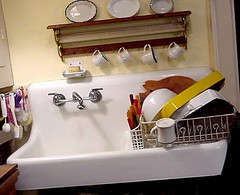
- Image by EraPhernalia Vintage via Flickr
Whether or not you own a dishwasher, cutting back on the amount of utensils you cook with can save you time and money. If you rely on disposable, some of these will work for you too.
Adopt these tips to wash fewer dishes:
- Have the whole family eat with their fingers straight out of the pot. (Okay, that was a joke. Did I have you going there for a minute?)
- Make one-pot meals using the gas-top, oven or crockpot.
- Skip extra courses, or use the same plate. For instance, a first course of bread and spreads can be eaten on the main dinner plate.
- Use smaller pots and plates, but not so small that food will spill or boil over.
- Label water cups, or spaces on a turntable or tray, with names of family members. They can manage with only one throughout the day.
- Plan cooking sessions in a sequence that uses as few utensils as possible. Chop similar items together. See Use Your Food Processor Efficiently for more ideas.
- Reuse dirty plates to hold peels, cores, etc. until you throw them into the compost or garbage.
- Serve straight from pots instead of putting food on serving dishes. See Individual Plates or Family Style? A Comparison of Serving Methods.
- Sometimes a plate requires only a rinse before reusing, or not even that. Use your judgment: If the plate with a few crumbs has been sitting for several hours, you probably don’t want to use it.
- Cooking food close to the time of your meal saves utensils used for storing large amounts of food.
- Keep a plate or “spoon-rest” next to the stove to keep spatulas and mixing spoons off an unsanitary counter. If I’ve emptied a can, I’ll hold spoons in there until I’ve finished.
What do you do in your kitchen to save on washing dishes?
Related:
One-Pot Meal: Chicken with Vegetables
Nine Tips to Help Food Last Longer

This is really an answer to how I make dishwashing more pleasant: lately, I wash the dishes after I do some work in the garden. Since my hands are full of dirt from the garden, at least I’m doing two things at once by washing dishes and washing my hands.
We bought coloured, plastic cups at Ikea. Each child knows her colour and uses the same cup all day. This cuts down on a lot of needless cup washing since kids tend to use a cup, put it down and forget which cup is theirs and then take a new cup for the next drink.
Great question. Since we decided to “Keep Kosher” the amount of dishes & dish washing sessions has increased DRAMATICALLY. I have not figured out how to have parve dishes, pots, utensils – so everything is dairy or meat & one set is washed before the other set is used. (If I had space for parve dishes, I could only see this as adding to the dishes – washing the parve before using dairy or meat.)
Leora, nice one.
Tziona, that is a good system.
A-H, this post addresses some of the concerns: http://www.amotherinisrael.com/2009/10/15/leftovers-and-the-kosher-kitchen/
If you’re not short on space in the fridge, store extra food in the cooking pot rather than moving it to a dish or “tupperware.” In addition to not needing to wash an extra dish, this also means that the next time you go to cook something, you’ll remember that you have leftovers of the same type (milchig or fleishig)
(on the other hand, if stuff is stuck to the bottom, you want to get water into it immediately to loosen the stuck-on food)
We also color-code our cups and bowls. It really helps. We don’t have color coded cups for Passover, so I washed cups constantly.
I bet that if I made the kids wash dishes, they would make fewer dishes. I did that once when they wanted to bake a cake, and I could see it influenced how many utensils they used.
I serve pizza and certain other foods on paper towels instead of plates.
Eating with hands is not bad. We do that from time to time in the Philippines especially if we are eating finger foods, grilled or fried fish and a sumptuous white rice. Yummmy.nice tips!